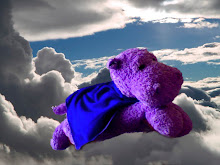The New York Times recently published this article discussing the recent emergence of a new category of quasi-adulthood, or "emerging adulthood," which puts the whole (unemployed) college-graduated 20-somethings living at home status under examination. It explains research about how the mind is still developing into its 20s, and how the embodiment of our age group has transformed drastically in the last decade or so. For example, the article states that today's 20-somethings
"reach the milestones [marks of adulthood] completely out of order, advancing professionally before committing to a monogamous relationship, having children young and marrying later, leaving school to go to work and returning to school long after becoming financially secure."
So we aren't becoming the cookie-cutter adults we're supposed to be as quickly as in the past. (Minus the fact that I didn't need to read 10 pages to find out) But does this really merit a completely new category of psychological development as discussed in the Times? Is the 20-something group so different from the 'real adults' that we need a category of 'emerging adulthood,' which is really just another way of saying an 'overgrown adolescence'?
I don't think so.
Yes, there may be proof of continuing brain development in the prefrontal cortex that change as we move closer to achieving or deciding on life paths, but those who endorse a new category of adulthood don't have their bases completely covered. 20-somethings today who choose to move home, marry later, return to school, or do whatever they want as opposed to join the real world, do so because they choose to. Choose is the key word. If necessary, they would have to settle on a path that would lead them to a more stable 'journey' to adulthood. The fact is that today many college graduates don't have to, so they put it off.
For example, if my parents kicked me out of the house today, forget the castle in the air idea I have of becoming an editor... any odd job that will pay my way will have to do. Maybe I sound like a hypocrite, stating there's no "emerging adulthood" stage when i'm possibly in it, but my point is that in the appropriate situation, I would face reality and grow up. 20-somethings are not incapable of getting a grip on reality and dealing with it. We're old enough to make decisions and deal with the consequences, as people our age have been doing for centuries.
This "emerging adulthood" (that is emerging primarily in developed nations, by the way) is the product of culture. Its happening whether we like it or not, but my point is that this new 'milestone' in life doesn't necessarily merit its own clinical psychological category. We're programmed to respond to our culture and environment, and here's where it has brought us. Take away any security blanket and see how the normal human reacts-- get a job and move on with life, right? No new brain connection developments needed.
Thursday, August 26, 2010
Wednesday, August 4, 2010
books or ebooks?
photo credits
The first thing I see when you walk into Barnes & Noble is a booth selling the Nook or Kindle. Reading ebooks has become extremely popular, especially since you can access them on your ipod, itouch, phone, or whatever portable electronic device you carry around, but I don't think convenience can ever replace the real thing. Similar to how the music industry suffered from illegal downloading and mp3s, the print industry is now suffering from digitalized access, and I personally think its a shame. Staring at my laptop screen as I eat Sunday brunch with my family (in a restaurant, no less) seems ridiculous, whereas reading them in paper form is our weekend ritual. I spent a large portion of my childhood reading at the dinner table and reading as I walked home from school (no joke)-- I don't think the habit would have been as easily acceptable if my eyes were glued to a screen of some sort (I was deprived video games as a kid on the premise that it would ruin my eyes. How futile-- I probably ruined them anyway by reading in bed.).
But really, a kindle that is stuffed to the terabytes with books can't be the same as browsing shelves of books, smelling the old-bookish smell, and reading them on the swing in the backyard. I don't think convenience is the reason that kids camp out each year for the newest Harry Potter book. What's a little electronic file to the cracked spines of some well-loved books? The thickness and weight of a good book in your hands is completely separate from the device that you use daily to schedule appointments or check your emails. Its the ticket to an adventure you can choose for yourself, separate from the daily clutter in life. It's the reason I continue to tuck books in my purse and fill my bookshelf to its double-stacked edges, and I don't plan on stopping.
Subscribe to:
Posts (Atom)

